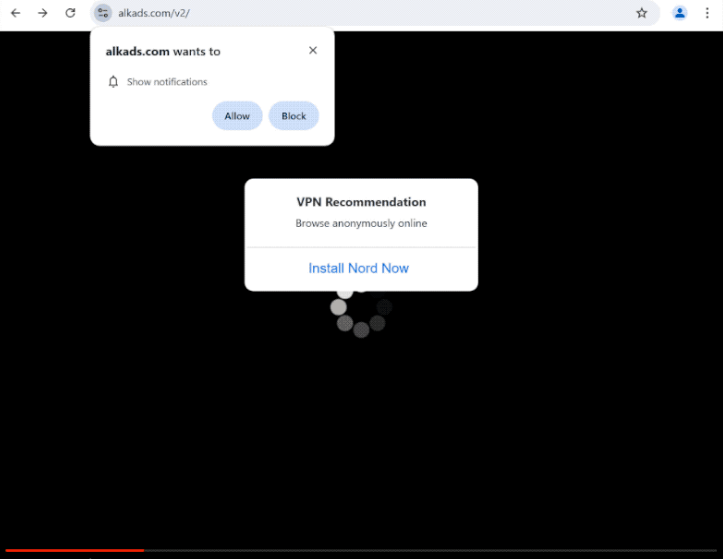alkads.com is a deceptive website that tries to trick users into allowing ads on the desktop. To do this, the site is misusing a legitimate browser feature that allows sites to request permission to show notifications on users’ desktops. Thus, when you get redirected to the site, it will show a browser alert saying “alkads.com wants to show notifications”. Legitimate sites show legitimate notifications but sites like alkads.com just spam ads. What’s more, the site may also display a scam in order to trick users into downloading questionable programs.
alkads.com is a misleading website that promotes several scams. It currently displays a warning suggesting that users need to download a VPN via the provided link. However, clicking on it is not a good idea as you would likely end up with a deceptive or even malicious program.
When you visit the site, a browser alert appears requesting permission to allow notifications from alkads.com. While this feature can be useful, alkads.com takes advantage of it to bombard users with intrusive advertisements. Unlike trustworthy sites, alkads.com does not provide valuable content through its notifications, opting instead to just spam ads.
We recommend you avoid clicking on notifications from alkads.com, as they may lead you to dubious or potentially harmful websites that promote scams or may conceal malware. If you’ve already allowed alkads.com to send notifications, it’s best to revoke that permission as soon as possible. You can find instructions for doing this at the end of this report.
What triggers redirects to sites like alkads.com?
When browsing certain websites, you might find yourself redirected to sites like alkads.com. This is especially common with sites that have pirated or adult content. These sites bombard users with ads and redirects no matter what users click on. Fortunately, you can effectively block these redirects with any decent adblocker program.
Being redirected to alkads.com may also suggest that your computer has adware installed. Adware and browser hijackers are often unintentionally installed by users when they install free programs. In what’s known as software bundling, adware, and hijackers are added to popular free programs as additional offers. These offers are set to install alongside without requiring explicit permission.
It’s important to note that these extra offers are always optional, and you can prevent their installation by simply unchecking them during installation. However, the issue is that these offers are typically hidden in settings that most users don’t usually use. Because of this deceptive installation method, it’s important to be vigilant when installing programs.
To prevent any unwanted offers from installing, always opt for Advanced (Custom) settings during the installation process instead of Default (Basic) settings. While the installation window will suggest Default settings, these settings conceal additional offers and allow them to install automatically.
Selecting Advanced or Custom settings will make any extra offers visible, giving you the choice to uncheck the ones you don’t want. Although some offers might seem useful initially, it’s recommended to block them from installing. Reputable programs do not use software bundling as an installation method due to its controversial nature, and programs that do are usually flagged as potential threats by anti-virus tools.
How to remove alkads.com notifications
If you find yourself frequently redirected to alkads.com, we recommend you scan your computer with an anti-virus program to check for an adware infection. Adware can be difficult to remove manually, so using an anti-virus tool is an easier option. You also need an adblocker program to help prevent redirects and block ads, especially when visiting ad-heavy websites.
If alkads.com has permission to display notifications, you need to revoke it. You can easily do so in your browser’s settings. If you need assistance navigating those settings, use the instructions provided below. You also have the option to completely disable notification requests if you do not plan to use this feature.
If you have given the site permission to show notifications, here’s how to revoke it:
- Mozilla Firefox: Open the menu (the three bars at the top-right corner), click Options, then Privacy & Security. Scroll down to Permissions, press Settings next to Notifications, and remove alkads.com and any other questionable websites from the list. It’s possible to permanently turn off push notification requests by checking the “Block new requests asking to allow notifications” box in the same Notifications settings.
- Google Chrome: Open the menu (the three dots top-right corner), then Settings, then Privacy and security, then Site Settings. Click on Notifications under Permissions, and remove alkads.com and any other questionable websites from the list. It’s possible to permanently turn off push notification requests by toggling off “Sites can ask to send notifications”.
- Microsoft Edge: Open the menu (the three dots top-right corner), then Settings, then Cookies and site permissions, then Notifications. Review which sites have permission and remove alkads.com and any other questionable websites from the list. It’s possible to permanently turn off push notification requests by toggling off “Ask before sending”.
Site Disclaimer
2-remove-virus.com is not sponsored, owned, affiliated, or linked to malware developers or distributors that are referenced in this article. The article does not promote or endorse any type of malware. We aim at providing useful information that will help computer users to detect and eliminate the unwanted malicious programs from their computers. This can be done manually by following the instructions presented in the article or automatically by implementing the suggested anti-malware tools.
The article is only meant to be used for educational purposes. If you follow the instructions given in the article, you agree to be contracted by the disclaimer. We do not guarantee that the artcile will present you with a solution that removes the malign threats completely. Malware changes constantly, which is why, in some cases, it may be difficult to clean the computer fully by using only the manual removal instructions.
